RBSE Solutions for Class 10 Maths Chapter 13 Surface Areas and Volumes Ex 13.1
Rajasthan Board RBSE Solutions for Class 10 Maths Chapter 13 Surface Areas and Volumes Ex 13.1 Textbook Exercise Questions and Answers.
Rajasthan Board RBSE Solutions for Class 10 Maths in Hindi Medium & English Medium are part of RBSE Solutions for Class 10. Students can also read RBSE Class 10 Maths Important Questions for exam preparation. Students can also go through RBSE Class 10 Maths Notes to understand and remember the concepts easily. Make use of our handy algebraic arithmetic sequences calculator and find the Sum of n terms of the arithmetic sequence.
RBSE Class 10 Maths Solutions Chapter 13 Surface Areas and Volumes Ex 13.1
Unless stated otherwise, take π = \(\frac {22}{7}\)
Question 1.
2 cubes each of volume 64 cm3 are joined end to end. Find the surface area of the resulting cuboid.
Solution:
Let each side of cube = x cm
Volume of cube = 64 cm3
Volume of cube = (Side)3
⇒ x3 = 64
⇒ x = \(\sqrt[3]{64}\)
⇒ x = \(\sqrt[3]{4 \times 4 \times 4}\)
⇒ x = 4 cm
∴ Side of cube = 4 cm
∴ When cubes are joined, a cuboid is formed where
length = 2x cm = 2(4) = 8 cm
breadth = x cm = 4 cm
height = x cm = 4 cm
Surface area of cuboid = 2[LB + BH + HL]
= 2 [8 × 4 + 4 × 4 + 4 × 8]
= 2 [32 + 16 + 32]
= 2 [80]
= 160
∴ Surface area of the cuboid = 160 cm2

Question 2.
A vessel is in the form of a hollow hemisphere mounted by a hollow cylinder. The diameter of the hemisphere is 14 cm and the total height of the vessel is 13 cm. Find the inner surface area of the vessel.
Solution:
Here, Diameter of hemisphere = Diameter of cylinder = 14 cm
2R = 14 cm
Radius of hemisphere (R) = 7 cm
Total height of the vessel = 13 cm
Height of the cylinder = (13 - 7) = 6 cm
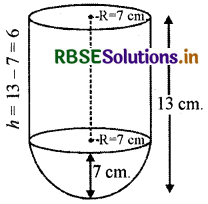
Internal surface area of the vessel = Internal curved surface area of the cylinder + Internal curved surface area of the hemisphere
= 2πRH + 2πR2
= 2πR [H + R]
= 2 × \(\frac{22}{7}\) × 7(6 + 7)
= 44 × 13
= 572 cm2
Hence the inner surface area of the vessel = 572 cm2
Question 3.
A toy is in the form of a cone of radius 3.5 cm mounted on a hemisphere of the same radius. The total height of the toy is 15.5 cm. Find the total surface area of the toy.
Solution:
Here, radius of cone = radius of hemisphere (R) = 3.5 cm
Total height of the toy = 15.5 cm
∴ Height of the cone (H) = (13.5 - 3.5) = 12 cm
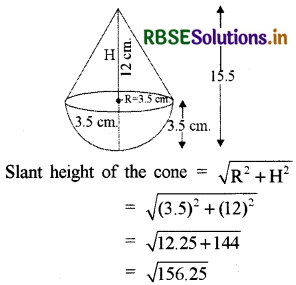
∴ Slant height of the cone (L) = 12.5 cm
Total surface area of the toy = Surface area of the cone + Surface area of the hemisphere
= πRL + 2πR2
= πR [L + 2R]
= \(\frac{22}{7}\) × 3.5[12.5 + 2(3.5)]
= \(\frac{22}{7}\) × 3.5[19.5]
= \(\frac{15015}{7}\)
= 214.5 cm2
Therefore the total surface area of the toy = 214.5 cm2

Question 4.
A cubical block of side 7 cm is surmounted by a hemisphere. What is the greatest diameter the hemisphere can have? Find the surface area of the solid.
Solution:
According to the question,
Side of the cubical block = 7 cm
Here, diameter of the hemisphere
Side of cubical block = 7 cm
2R = 7
The greatest diameter of the hemisphere = 7 cm
R = \(\frac{7}{2}\) cm
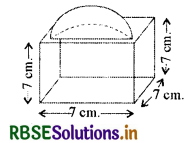
Surface area of solid = (Surface area of cube) - (Area of the base of the hemisphere) + (Curved surface area of the hemisphere)
= 6 × (Side)2 - πR2 + 2πR2
= 6 × (Side)2 + πR2
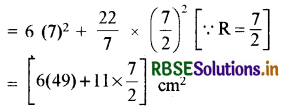
= (294 + 38.5) cm2
= 332.5 cm2
So the greatest diameter of the hemisphere = 7 cm
and surface area of the solid = 332.5 cm2
Question 5.
A hemispherical depression is cut out from one face of a cubical wooden block such that the diameter I of the hemisphere is equal to the edge of the cube. Determine the surface area of the remaining solid.
Solution:
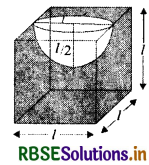
Let the side of the cube = l
Here, the diameter of the hemisphere = side of the cube
⇒ 2R = l
⇒ R = \(\frac{l}{2}\)
The surface area of the remaining solid = Total surface area of the cube - Area of the base of the cube + Inner curved surface area of the hemisphere
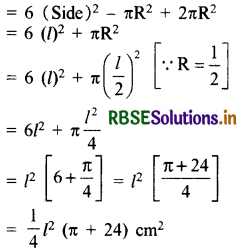
Therefore the surface area of the remaining solid = \(\frac{l^{2}}{4}(24+\pi)\) cm2
Question 6.
A medicine capsule is in the shape of a cylinder with two hemispheres stuck to each of its ends (see Fig.). The length of the entire capsule is 14 mm and the diameter of the capsule is 5 mm. Find its surface area.
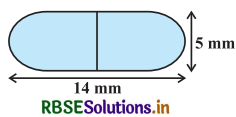
Solution:
Here, diameter of capsule = Diameter of hemisphere = Diameter of cylinder = 5 mm
∴ 2R = 5 mm
R = \(\frac{5}{2}\) mm
Internal length of capsule = 14 mm
Height of the cylindrical portion = \(\left(14-\frac{5}{2}-\frac{5}{2}\right)\) mm
H = (14 - 5) mm
H = 9 mm
The surface area of capsule = curved surface area of cylinder + 2 curved surface area of hemisphere
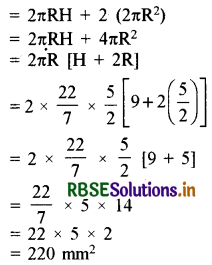
So, the surface area of the capsule = 220 mm2
Question 7.
A tent is in the shape of a cylinder surmounted by a conical top. If the height and diameter of the cylindrical part are 2.1 m and 4 m respectively, and the slant height of the top is 2.8 m, find the area of the canvas used for making the tent. Also, find the cost of the canvas of the tent at the rate of Rs. 500 per m2. (Note that the base of the tent will not be covered with canvas.)
Solution:
Here, Diameter of cone = Diameter of cylinder
2R = 4
R = 2 m
So, Radius of cone = Radius of cylinder
R = 2 m
Height of cylinder (H) = 2.1 m
Slant height of cone (L) = 2.8 m
The surface area of tent = Curved surface area of cylinder + Curved surface area of the conical portion
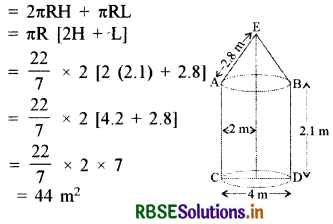
∴ The surface area of the tent = 44 m2
∵ Cost of 1 m2 canvas = Rs. 500
∴ Cost of 44 m2 canvas = 44 × 500 = Rs. 22000

Question 8.
From a solid cylinder whose height is 2.4 cm and diameter of 1.4 cm, a conical cavity of the same height and same diameter is hollowed out. Find the total Surface area of the remaining solid to the nearest cm2.
Solution:
Diameter of cylinder (D) = 1.4 cm = Diameter of cone
∴ Here, Radius of cyliner = Radius of cone (R) = 0.7 cm.
Height of cylinder (H) = 2.4 cm
We know that L2 = R2 + H2
L = \(\sqrt{(0.7)^{2}+(2.4)^{2}}\)
= \(\sqrt{0.49+5.76}\)
= \(\sqrt{6.25}\)
L = 2.5 cm
The total surface area of the remaining solid = Curved surface area of the cylinder + Area of the upper base of the cylinder + curved surface area of a cone
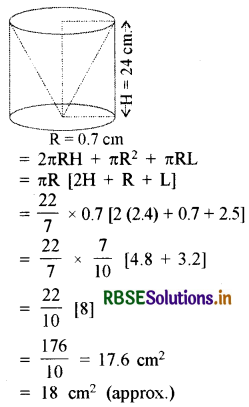
So, the total surface area of the remaining solid = 17.6 ~ 18 cm2
Question 9.
A wooden article was made by scooping out a hemisphere from each end of a solid cylinder, as shown in Fig. If the height of the cylinder is 10 cm, and its base is of radius 3.5 cm, find the total surface area of the article.
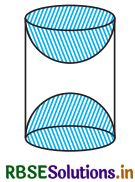
Solution:
Height of cylinder (H) = 10 cm
Here Radius of cylinder = Radius of hemisphere (R) = 3.5 cm
The total surface area of the article = Curved surface area of cylinder + 2 surface area of hemisphere
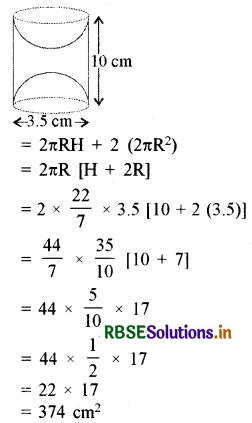
So the total surface area of the article = 374 cm2

- RBSE Solutions for Class 10 Maths Chapter 6 त्रिभुज Ex 6.3
- RBSE Solutions for Class 10 Maths Chapter 9 त्रिकोणमिति के कुछ अनुप्रयोग Ex 9.1
- RBSE Solutions for Class 10 Maths Chapter 11 रचनाएँ Ex 11.2
- RBSE Solutions for Class 10 Maths Chapter 11 रचनाएँ Ex 11.1
- RBSE Solutions for Class 10 Maths Chapter 8 त्रिकोणमिति का परिचय Ex 8.1
- RBSE Solutions for Class 10 Maths Chapter 7 निर्देशांक ज्यामिति Ex 7.1
- RBSE Solutions for Class 10 Maths Chapter 14 सांख्यिकी Ex 14.3
- RBSE Solutions for Class 10 Maths in Hindi Medium & English Medium
- RBSE Solutions for Class 10 Maths Chapter 15 प्रायिकता Ex 15.2
- RBSE Solutions for Class 10 Maths Chapter 15 प्रायिकता Ex 15.1
- RBSE Solutions for Class 10 Maths Chapter 14 सांख्यिकी Ex 14.4